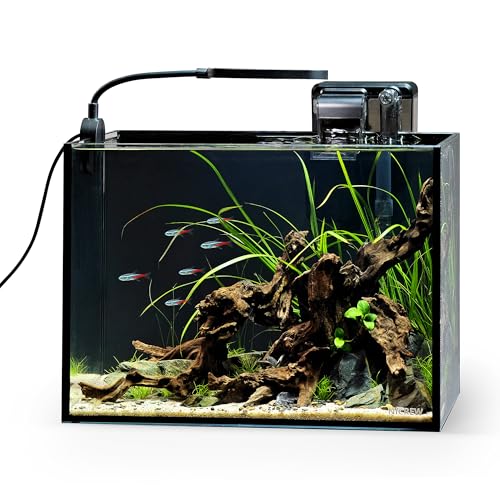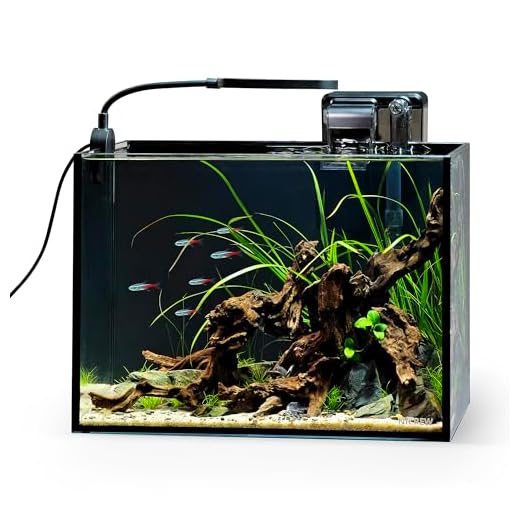Reef
Blog
How big does a betta fish tank need to be

A betta fish, also known as Siamese fighting fish, is a popular choice for many fish enthusiasts. These vibrant and beautiful fish are known for their long, flowing fins and striking colors. However, when it comes to providing a proper living environment for them, size does matter.
Many people mistakenly believe that betta fish can be kept in small bowls or tiny tanks. However, the truth is that bettas require a larger tank to thrive and live a healthy life. The minimum tank size recommended for a betta fish is 2.5 gallons, although a larger tank is always better.
Why do bettas need a larger tank? One of the main reasons is that bettas are active fish and need room to swim and explore. In a small bowl or tank, they may become stressed and bored, leading to health issues. Additionally, bettas are known to produce a large amount of waste, and a small tank can quickly become dirty and polluted, which can be harmful to the fish.
Providing a larger tank for your betta fish not only allows them to have more space to move around, but it also provides better water quality. A bigger tank means more water volume, which dilutes the waste produced by the fish, making it easier to maintain clean and healthy water conditions. It also allows for a more stable water temperature and reduces the risk of temperature fluctuations that can stress the fish.
Remember, a betta fish tank should never be overcrowded with decorations or tank mates, as this can cause stress and aggression in the fish. It’s important to provide a well-maintained and properly sized tank to ensure the well-being and happiness of your betta fish.
Importance of tank size for betta fish
Ensuring the appropriate tank size for your betta fish is crucial for their overall health and well-being. Betta fish are known for their vibrant colors and graceful movements, but they also have specific needs when it comes to their living space.
A tank that is too small can restrict their movement and lead to stress and poor health. Betta fish prefer to have ample space to swim around, explore their surroundings, and establish their territories. Furthermore, they are prone to a variety of health issues if they are kept in cramped conditions.
It’s recommended to provide betta fish with a tank size of at least 5 gallons (approximately 19 liters). This will ensure that they have enough space to exhibit their natural behaviors. Larger tanks are even better, as they offer more swimming space and allow for greater flexibility in terms of decoration and setup.
A larger tank also helps to maintain a stable and healthy environment for your betta fish. It provides a larger water volume, which dilutes toxins and helps to stabilize water parameters such as temperature, pH, and ammonia levels. This is essential for maintaining optimal water quality and ensuring the overall well-being of your betta fish.
In addition to tank size, it’s important to consider the tank’s shape and design. Betta fish are known for their long, flowing fins, so tanks with a taller rather than wider design can provide them with more vertical swimming space. Adding plants and decorations can also create hiding spots and resting areas, mimicking their natural habitat and reducing stress.
In conclusion, providing your betta fish with an appropriately sized tank is crucial for their health and happiness. A larger tank not only allows for more natural behavior and movement but also helps to maintain optimal water quality. By meeting their needs for space and a suitable environment, you can ensure that your betta fish thrives and remains a beautiful addition to your home.
Factors to consider when choosing a betta fish tank
Choosing the right tank for your betta fish is crucial to their wellbeing and overall health. There are several factors to consider before purchasing a tank for your betta fish:
Tank size
The size of the tank is one of the most important factors to consider. Betta fish are known for their long fins and vibrant colors, and they need space to swim around comfortably. A tank that is too small can lead to stress and health problems for the fish. The minimum recommended tank size for a betta fish is 2.5 gallons, but a larger tank is always better.
Shape and design
Betta fish tanks come in various shapes and designs, including rectangular, round, and bow-front tanks. It is important to choose a tank that provides enough surface area for the fish to swim and breathe comfortably. Tanks with a wider surface area are preferred over taller tanks, as betta fish primarily breathe from the surface and need easy access to fresh air.
Filtration system
A good filtration system is essential for maintaining water quality in the betta fish tank. Betta fish are sensitive to water parameters, and a tank with an inadequate filtration system can quickly become polluted and harmful to the fish. Look for a tank with a filter that can handle the size of the tank and effectively remove waste and toxins.
Water temperature is another crucial factor to consider when choosing a betta fish tank. Betta fish are tropical fish and require a constant water temperature between 75°F and 82°F. It is important to choose a tank that allows for easy temperature regulation, either through a built-in heater or an external heating system.
Overall, a betta fish tank should provide enough space, proper filtration, and an appropriate temperature to ensure the health and wellbeing of the fish.
Recommended minimum tank size for betta fish
In order to provide a suitable and comfortable living environment for a betta fish, it is important to consider the tank size. While betta fish can survive in small bowls or tanks, it is recommended to provide them with a larger tank to promote their well-being.
The minimum tank size for a betta fish should be at least 2.5 gallons. This size provides enough space for the fish to swim around and exercise, as well as ensures the water quality remains stable. A tank of this size can also be easily maintained and allows for the installation of a heater and filter, which are essential for betta fish health.
However, it is always better to opt for an even larger tank if possible. A tank size of 5 gallons or more will greatly improve the betta fish’s quality of life. A larger tank provides more swimming space, reduces the frequency of water changes, and allows the fish to exhibit natural behaviors. It also provides more stable water parameters and allows for more tank mates, such as snails or peaceful fish species.
Benefits of a larger tank:
1. Improved water quality and stability: Larger tanks have more water volume, which helps dilute toxins and maintain stable water parameters. This results in a healthier and happier betta fish.
2. Natural behaviors: Betta fish are naturally active and curious. A larger tank allows them to explore their environment, exhibit natural behaviors like flaring their fins, and reduces boredom.
Tips for maintaining a betta fish tank:
1. Regular water changes: Regardless of the tank size, it is important to maintain good water quality by performing regular water changes. A small tank may require more frequent water changes compared to a larger tank.
2. Proper filtration: Installing a filter in the tank helps remove waste and keeps the water clean and clear. Make sure to choose a filter with adjustable flow, as betta fish prefer calm waters.
3. Maintaining water temperature: Betta fish are tropical fish and prefer warm water. Using a heater in the tank will help maintain a stable temperature between 78-80°F (25-27°C).
In conclusion, while a betta fish can survive in a small tank, it is recommended to provide them with a minimum tank size of 2.5 gallons. However, a larger tank of 5 gallons or more is even better for their well-being. Remember to consider the fish’s comfort, behavior, and water quality when deciding on the appropriate tank size for your betta fish.
Benefits of providing a larger tank for betta fish
A larger tank can offer numerous benefits for betta fish, contributing to their overall health and well-being. Here are some key advantages of providing a spacious habitat for your betta:
1. Ample swimming space
A larger tank provides betta fish with plenty of room to swim around and explore. Betta fish are highly active and love to move around, so a larger tank allows them to exhibit their natural behavior. Adequate swimming space promotes exercise, which is crucial for maintaining good overall health.
2. Improved water quality
A larger tank offers more water volume, which helps to maintain stable water parameters. With a larger volume of water, there is a greater dilution of toxins, waste, and uneaten food, reducing the risk of poor water quality. This can help prevent issues such as fin rot, ammonia burns, and other health problems that can arise from poor water conditions.
3. Enhanced filtration system
A larger tank allows for the use of a more powerful and efficient filtration system. This helps to remove debris and waste more effectively, ensuring cleaner water for your betta fish. A good filtration system plays a crucial role in maintaining optimal water conditions, which can contribute to improved betta fish health and longevity.
4. Reduced stress and aggression
In a larger tank, betta fish have more space to establish their territories and avoid each other, reducing aggression and stress. A small tank can lead to territorial disputes and increased aggression between bettas, which can result in fin damage and physical injuries. Providing ample space can help foster a more harmonious and peaceful environment for your betta fish.
Overall, a larger tank provides numerous advantages for betta fish, promoting their physical and mental well-being. It allows them to exhibit natural behavior, maintain good water quality, and reduce stress and aggression. Investing in a larger tank is a worthwhile investment in the long-term health and happiness of your betta fish.
Question-answer
What is the recommended size for a betta fish tank?
The recommended size for a betta fish tank is at least 5 gallons. This allows the betta fish to have enough space to swim and explore.
Can I keep a betta fish in a small bowl?
It is not recommended to keep a betta fish in a small bowl. Betta fish need a larger tank to thrive and stay healthy. A small bowl does not provide enough space or proper filtration.
Do betta fish need a heater in their tank?
Yes, betta fish need a heater in their tank to maintain a constant water temperature. Betta fish are tropical fish and require a water temperature between 78-80 degrees Fahrenheit.
What happens if I keep a betta fish in a tank that is too small?
If you keep a betta fish in a tank that is too small, it can lead to stress, poor water quality, and stunted growth. Betta fish need enough space to swim and explore, as well as a properly filtered and heated environment.
Can I keep multiple betta fish in the same tank?
No, betta fish are territorial and should not be kept together in the same tank. They will likely fight and injure each other. It is best to keep betta fish alone in their own tank.
What is the ideal tank size for a betta fish?
The ideal tank size for a betta fish is at least 2.5 gallons (9.5 liters). However, a larger tank of 5 gallons (19 liters) or more is highly recommended as it provides more swimming space and allows for better filtration and water stability.






